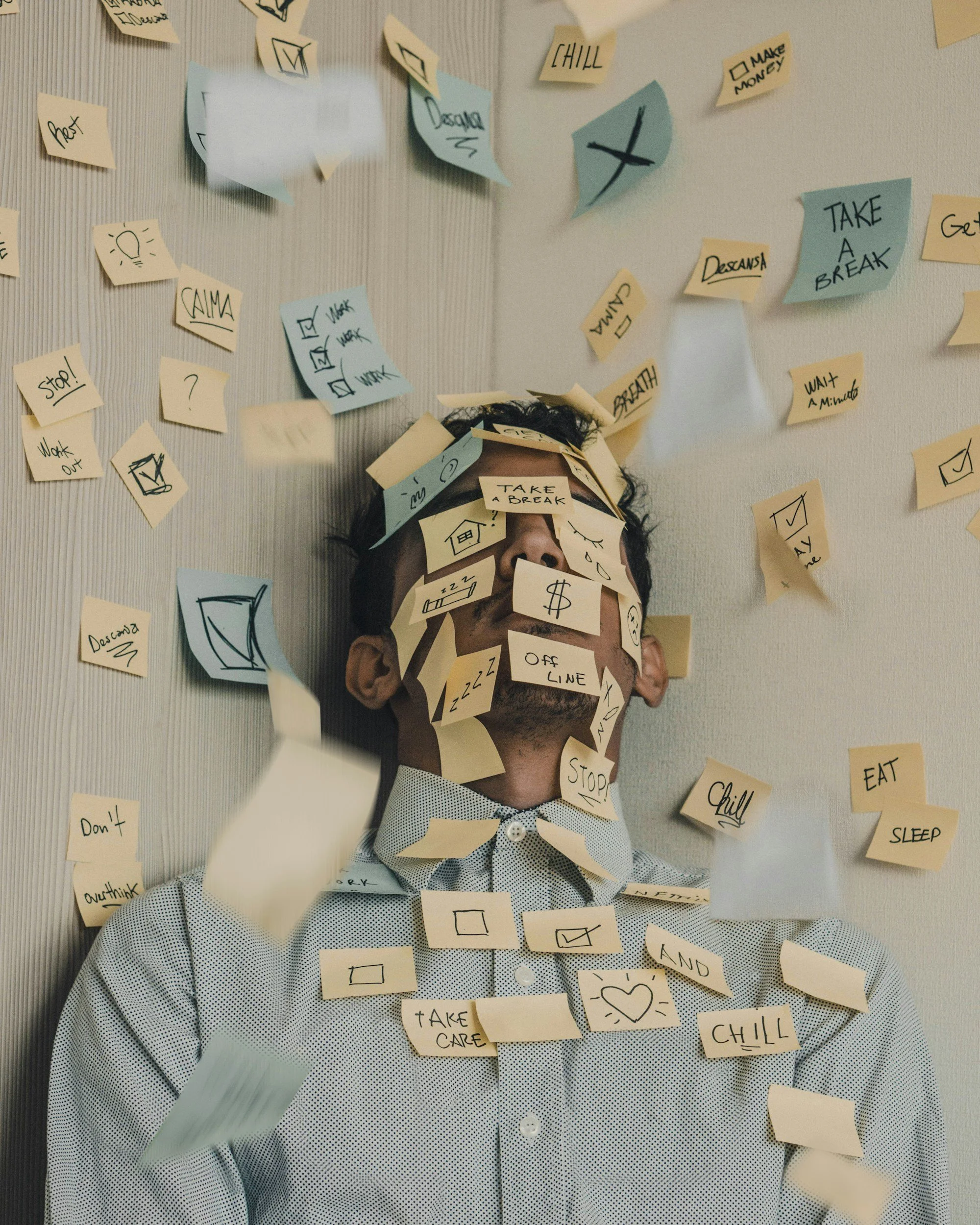Supporting a Loved One With Adult ADHD: from Judgement to Understanding and Acceptance
Loving someone with Attention Deficit Hyperactivity Disorder (ADHD) can be an enriching journey filled with creativity, passion, and adventure. It can also be frustrating and challenging when we perceive our partners brain differences as deficits with bad or careless intentions. When the latter happens, we are more likely to judge or criticize our partners, which only fuels tension and disconnection in the relationship. For the person with ADHD, it also adds to the shame they likely already feel for their struggles (hello, internalized ableism). That is why it's essential to understand the unique challenges that come with this invisible disability.
ADHD affects attention, executive functioning (planning, organizing, etc) impulse control, and emotional regulation. In relationships, this often leadings to misunderstanding, miscommunication and sometimes even shame and criticism.
If you’re reading this- thank you, you clearly care about your partner and don’t want to shame them. I am a firm believer that we can move out of judging others when we have more knowledge and understanding about why they are the way they are. At ED and OCD Therapy, we often work with neurodivergent folks who deal with chronic misperception and this can really erode someone’s self esteem and self trust.
So let’s dive in to what you need to know about your loved one with ADHD.
ADHD & Disability
ADHD is an invisible disability and a form of neurodiversity. This means its challenges aren’t always visible from the outside. You can’t “see” time amnesia, executive dysfunction, or emotional regulation struggles the way you might see someone using a mobility aid. Because of this invisibility, partners of people with ADHD sometimes underestimate how profoundly it impacts daily life, self-esteem, and relationships.
It can help to pause and reflect: If your loved one used a wheelchair, would you get frustrated that they couldn’t walk up stairs, or would you help build a ramp?
Supporting someone with ADHD requires that same kind of compassion and creativity.
ADHD Signs and Symptoms
ADHD is defined by patterns of inattention, hyperactivity, and/or impulsivity that interfere with functioning across multiple settings (home, work, school, relationships). Here’s what these traits looks like in day to day life:
Inattention
This isn’t about “not caring” rather it is difficulty regulating focus, especially when something feels repetitive, boring, or overwhelming.
You might notice your partner:
Loses track of time or gets “stuck” in hyperfocus on one thing (usually something they are very interested in and can’t stop talking about!)
Forgets daily details like appointments, items, or tasks
Starts projects with enthusiasm but struggles to finish
Seems to listen but later forgets what was said (their mind drifted unintentionally, they aren’t “conveniently forgetting”)
Avoids tasks that require sustained mental effort
Gets easily distracted by sounds (or lack of), ideas, or internal thoughts
Has a hard time organizing priorities or following multi-step plans
Hyperactivity / Impulsivity
You might notice your partner:
Talks rapidly or interrupts without meaning to
Acts before thinking or makes quick decisions
Feels “on the go” all the time, seems unable to slow down
Gets easily frustrated when bored or understimulated (ADHD brains register boredom as physical pain, so they often work hard to prevent this feeling)
Struggles to relax or “turn off” their mind
Feels emotions intensely and reacts quickly
Your partner likely has bursts of energy followed by exhaustion because their symptoms appear as:
Chronic perfectionism or overachievement
Excessive people-pleasing
High anxiety or emotional sensitivity
Fatigue and internalized shame
Difficulty knowing capacity and over-committing to projects
Challenges with focus and taking longer to perform ‘simple’ tasks
Difficulties with task switching and transitions
Taking on more work than others to compensate for feeling inferior
What’s happening inside the ADHD brain?
If you’re like me, you also want know why these symptoms happen. To a non-ADHD person, it might seem so easy to just change the ‘problem’ behavior. However, ADHD isn’t a lack of willpower or discipline, it’s a neurological condition involving differences in brain chemistry and structure, particularly in the prefrontal cortex and dopamine/norepinephrine systems.
Here’s how this impacts your loved one with ADHD:
Dopamine dysregulation affects motivation, focus, and reward. Tasks that aren’t immediately stimulating or rewarding can feel almost impossible to start, no matter how important they are.
Norepinephrine dysregulation impacts alertness, sustained attention, and arousal levels; making it hard to maintain consistent focus or energy.
The prefrontal cortex (responsible for executive functioning) may develop differently, leading to challenges with planning, working memory, and emotional regulation.
Differences in interoception (the ability to sense what’s happening inside your body) can create clumsiness, hunger/sleep confusion, or trouble recognizing fatigue or stress.
ADHD brains also often have altered circadian rhythms, leading to difficulties with sleep onset, irregular sleep patterns, and morning or afternoon brain fog.
A Note on High Masking ADHD
ADHD can present differently for those socialized as women (or anyone assigned female at birth including non-binary and trans folks), this is because gender role socialization teaches women to mask emotions, claiming we are “too emotional.” This masking also lends to masking other traits about ourselves that society deems undesirable. This means they work hard to hide, compensate, or over function. These women often appear “put together” while internally struggling- often describing their minds as “scattered” or never quiet.
Since this is invisible and on the outside your loved one might be high achieving and very successful in work or school, it can leave partners confused as to what their capacity, ability and support needs actually are. For this reason, ADHD was previously thought of as a boy/male issue- leaving so many women and non-binary folks undiagnosed! The truth is, the symptoms just show up a little differently. This might look more like:
Inattentive Traits
Forgetting important dates, chores, or conversations
Zoning out or daydreaming during discussions
Appearing “lazy” or “disengaged” when actually overstimulated or overwhelmed
Struggling to transition between tasks or shift attention
Chronic lateness or difficulty estimating time (time amnesia)
Brain fog or sluggishness in the morning or mid-afternoon due to energy regulation issues
Hyperactive / Impulsive Traits
Talking over others or interrupting (due to impulsivity, not disrespect)
Difficulty waiting or tolerating slow-moving situations
Restlessness or fidgeting during conversations
Rapid topic shifting or jumping into new ideas mid-discussion
Taking on too many tasks or “over-functioning” due to people-pleasing and Rejection Sensitive Dysphoria (RSD)
Difficulty assessing risk accurately, leading to impulsive decisions or novelty-seeking behaviors
How ADHD Traits Show Up in Relationships
Sensory, Trust and Interoceptive Challenges
Changing clothes multiple times due to sensory discomfort (as women there is often an assumption this is about vanity)
Appearing clumsy or easily startled (sexism portrayals of women being clueless or air headed means “clumsiness” is brushed off as a part of that rather than a genuine proprioception issue)
Fluctuating appetite, temperature sensitivity, or inconsistent awareness of physical needs
Needing reassurance or other forms of reminders that you like/love them (rejection sensitivity means we are sometimes over-aware of any slight disconnect)
Impulsivity/ high stimulation needs might make the other partner feel “boring” in comparison to their ADHD loved one
Extramarital affairs or cheating is unfortunately slightly more common with ADHDers than non-ADHDers due to higher needs for novelty seeking and aversion to boredom (not everyone with ADHD will cheat, but it is something to be aware of so it can be discussed ahead of time and prevented by planning how your loved one will get their novelty needs met in the context of a long term relationship. And, ADHDers are responsible for their behavior despite the urges to act on impulsive decisions)
These behaviors can easily be misinterpreted as careless or self focused but they’re often symptoms of a brain working incredibly hard to navigate a neurotypical world. Think of it like your computer when there are tons of tabs open, the computer is not operating as efficiently, it might speed up and then slow down or freeze. ADHDers have a lot of tabs open in their brains at all times, and it’s hard for them to filter them out the way a non-ADHD brain does.
How can you best support your loved one with ADHD?
Here are some examples:
Assume good intent: forgetfulness or distractibility isn’t a lack of care. It’s a neurological difference. Assume your partner wants to do well and is likely already feeling shame about their challenges.
Collaborate, don’t correct: replace “Why can’t you just…?” with “What systems or supports would make this easier for you?”
Build external scaffolding together: use shared calendars, reminders, whiteboards, or visual cues to distribute cognitive load instead of relying on memory alone.
Offer emotional regulation support: during moments of overwhelm, gentle validation (“I know it’s a lot right now”) can calm the nervous system far more than logic or advice.
Avoid moralizing ADHD traits: messiness, lateness, or forgetfulness are not character flaws, they’re signs of executive dysfunction. Compassion helps more than criticism.
Encourage your loved one to seek help from neurodiversity affirming specialists: psychiatrists, therapists, support groups.
Looking for more support?
Whether you’re looking for therapy for yourself or your loved one, we are here to help. We utilize a neurodiversity affirming framework with our ADHD clients and several of our clinicians are ADHDers ourselves. We want to help you thrive in your relationship and personal healing. Reach out to us for more information or to set up a free consultation call!
We see therapy clients in CA, WA, UT, MD and FL. Outside of those states, we work with folks worldwide in a coaching capacity.



